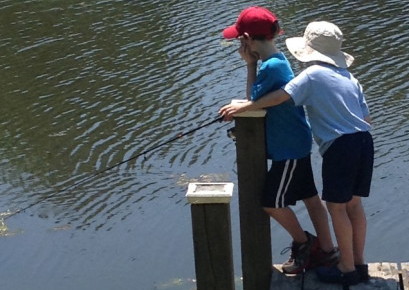How Do We Teach Empathy?
In a parent-teacher conference years ago, my son was commended for the empathy he consistently displayed in the classroom. “Empathy can’t be taught,” the teacher said, meaning that as a compliment on our parenting.
Fast forward to now. The boys are in 4th and 5th grade, and as their personalities develop, empathy sometimes seems less prevalent as they try on different traits- like being competitive or goofy- and become more concerned about how their peers perceive them. With competing social pressures and a shifting sense of self-image, how do we emphasize empathy?
In Thom Markham’s Mind/Shift article Why Empathy Holds the Key to Transforming 21st Century Learning, he argues that empathy can, and should, be the foundational element for a strong 21st century education. According to the article, a well-developed sense of empathy will improve collaboration, whole child learning, inquiry, and creativity.
Markham explains, “Empathy results from a complex mix of other meaningful emotions and attitudes that fuel human personality, such as openness, curiosity, self-restraint, vulnerability, sensitivity, awareness, respect, appreciation, and even love.”
Another component I would add to this mix is gratitude. When children practice gratitude, they develop an appreciation of their surroundings and the people in their lives that help them see beyond their own egos. And if they learn to be grateful for small moments, little things in their daily lives, everything else comprising empathy will come more naturally.
This time of year offers a natural introduction to practicing gratitude. Starting with Thanksgiving, when many of us go around the table and ask what everyone is thankful for, it’s easy to continue the conversation throughout the holidays. As kids develop Christmas lists and talk about what they hope to get from Santa this year, balance the conversation with a discussion of what you’re grateful for. For example, one of our traditions is to get up early the morning after Thanksgiving and meet my parents at a local Christmas tree farm. No matter the weather, we arrive a little bit before 9:00, get our tag, and then traipse through the woods to the field of trees in hopes we will find the perfect one for our living room. Most years we find a tree, but even in the few when there weren’t any that were tall enough, we still valued the experience, and the boys were grateful we kept with the tradition of going to the farm.
When you practice gratitude consistently, it leads to an overall positive outlook on life that others notice and gravitate toward. This lends itself to empathy, which, Markham says, “has the potential to open up students to deeper learning, drive clarity of thinking, and inspire engagement with the world—in other words, provide the emotional sustenance for outstanding human performance.”
And, as Markham also notes, it facilitates creativity and collaboration, which in today’s world is a key component to developing innovation. In order to collaborate, people need strong social-emotional intelligence. Empathy is key to this, and, with practice, it can be taught. It needs to be nurtured, encouraged, and reinforced.
So… what are you grateful for today?

